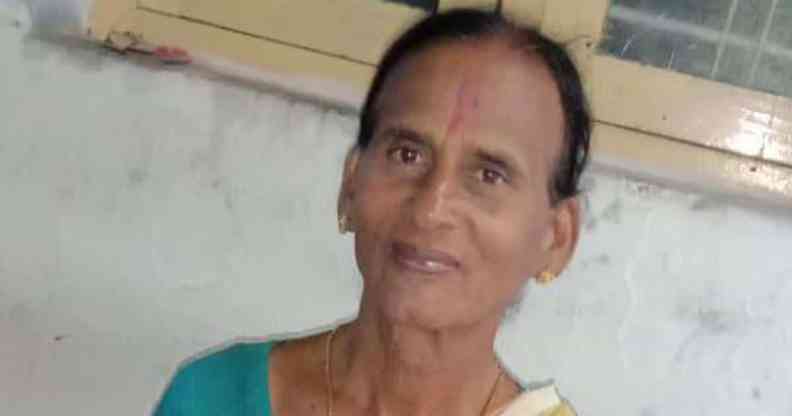A trans elder gave a man a job and let him stay at her home out of kindness. He sexually assaulted her and slit her throat

Sangeetha, a trans elder who helmed a local activist group and sought to create opportunities for trans locals left threadbare by the pandemic. (Facebook)
A man has confessed to the murder of a trans elder seen by many as a bedrock of the Coimbatore, India, LGBT+ community.
R Rajesh, 23, handed himself over to law enforcement and admitted to the chilling killing of M Sangeetha, the 59-year-old chief of the Transgender Association, on Thursday (October 22), The Hindu reported.
Sangeetha hired Rajesh to cook at Covai Trans Kitchen, an eatery staffed by a dozen trans people that she set up to help trans folk hit by the coronavirus.
With a 200 mile-long commute from Rajesh’s home in the Nagapattinam district, Sangeetha let him stay with her out of kindness.
On October 21, police found Sangeetha with her throat slit, her body stuffed into a rain barrel wrapped in plastic and covered in salt. Investigators suggested this was done to delay decomposition.
Former chef confesses to slaying ‘respected’ trans elder who was a crucial lifeline to more than 100 trans residents.
Just one day after the discovery, Rajesh surrendered himself to the Sanganoor Village Administrative Office.
He confessed that he killed Sangeetha Sunday night (October 25) after she threatened to go to the police to report that he had sexually assaulted her.
He stole 20,000 rupees from the victim and later fled to his hometown.
Sangeetha’s absence alarmed Transgender Association members and Covai Trans Kitchen staffers, which had been forced to shutter as a result.
Concerned friends visited her rented one-bedroom in Sai Baba only to find neighbours complaining of a “foul smell”.
Local trans activists all too familiar with threats to their safety decried her death as “disheartening” to The Hindu.
Kalki Subramaniam, an artist, described the victim as “respected”, adding: “Such crimes against transgender [people] must be taken seriously by the police and the legal system.”
Sangeetha’s death deeply disturbed trans community leaders. Subramaniam slatedthe Coimbatore authorities and celebrities on Twitter for not “speaking up” about the murder.
Many campaigners remembered Sangeetha as a mother figure whose very existence tested the transphobes around her. She tirelessly fought to make space for trans Indians, whether creating welfare programmes or employment opportunities through her restaurant.
In the days before her death, her friends told HuffPost India, she had planned to help more than 120 trans locals by donating supplies of rice, dal and oil.
“I can’t believe she’s gone,” activist and friend Grace Banu said.

